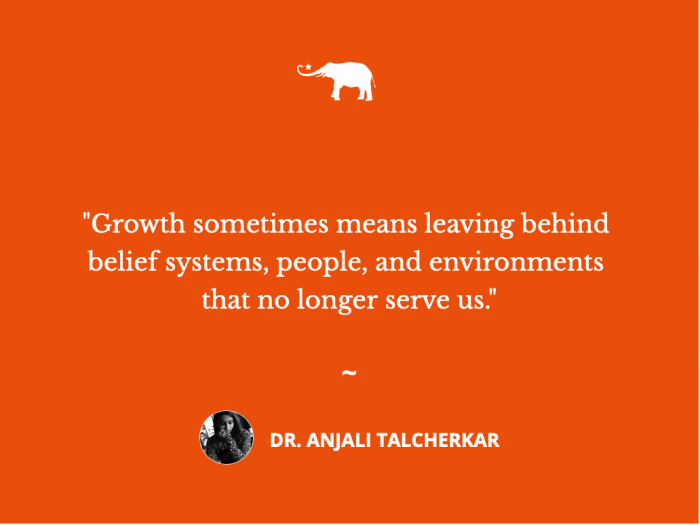What does recovery mean?
Does it mean never taking a drink again, or does it mean having a happy, healthy, wholesome life?
Does one influence the other? Maybe, maybe not. That’s a personal choice.
Allow me to introduce myself:
My name is Anjali. I am not an alcoholic. I am not an addict. I am not a label, nor am I a diagnosis. I will also not use this platform to give you a long list of adjectives describing who I am because no words or labels do justice in defining me.
But, let’s backtrack to the beginning, a time when you would have never heard these words come out of my mouth. From the age of 15, I engaged in substance use; my early treatment, which was a product of a medical discourse espoused by a disease framework, led others to label me as a lifelong addict.
I was sent to Western practitioners and doctors who defined me according to their standards and training. What resulted were years of being shuffled from outpatient/inpatient programs to psychiatrists to self-help support groups to halfway homes, and the list continues ad infinitum. I picked up a few helpful tools and educated myself along the way, but these formative experiences programmed me to believe in the disease ideology.
At that point, I knew myself as “Anjali—alcoholic/addict.”
Over the years, I had trained myself to cope with life through drugs and alcohol and probably a handful of other maladaptive behaviors. Basically, when people fail to meet their basic human needs in productive and healthy ways, such behavior is perceived as pathological when in reality, it is actually quite normal.
Here’s why:
Everything in the world of form (I repeat: everything) has a propensity toward addiction. My point is that all objects, substances, behaviors, et cetera, could potentially be classified as addictive. Still, in the end, it’s all just learning—the brain doesn’t recognize it as “good or bad” or “normal or abnormal.” The brain only recognizes neural patterns; repetition of behavior carves out distinct neural pathways in the brain—neurons that fire together, wire together. I brush my teeth twice a day, daily.
If I don’t, does my life become unmanageable? Um, well, my dental hygiene might.
Is this daily ritual an addiction? No! It’s a normal, learned behavior and also an everyday choice.
As life progressed, the real test for me was transcending addiction altogether—moving beyond duality: addiction versus recovery. I stayed abstinent for six years until the tail end of my doctoral dissertation when the themes of choice, empowerment, and autonomy appeared in my data analysis, challenging me to give up the only world of recovery that I knew. I was left in a quandary: was I really powerless, or had I been brainwashed to believe I was by an industry that profits from people staying chronically sick?
It’s known that the etiology, or understanding of addiction, greatly affects the way in which treatment is approached. Sussman and Sussman noted:
“At its origin, ‘addiction’ simply referred to ‘giving over’ or being ‘highly devoted’ to a person or activity, which could have positive or negative implications. Over the last 400 years, some statements made about addiction began to frame it as involving strong, overpowering urges, and, over the last 200 years, this word has become considered more and more disease-like in connotation.”
During my doctoral research, I looked at the history of addiction treatment and how it has evolved over time. I addressed addiction models, the current premises for approaching addiction and recovery, including definitions, each models’ relationship to spirituality and healing, and validated benefits to health and well-being. I also reviewed alternative models of addiction, specifically how Ayurveda views and treats addiction. It was around 2018 that I found myself aligning with an entirely different perspective.
Taken from my dissertation:
“It was a risky experiment, as I was giving up nearly six years of continuous abstinence, but what I would be gaining was far more important: self-agency and power over my own life. With the culmination of this research, I abandoned my belief in the disease model concept and managed to overcome previous fears about the use of alcohol and drugs in general.”
In my personal evolution, releasing the former addict identity and previous conditioning was vital in my reintegration process, spiritual development, and return to Self. When connected to Self, duality does not exist. Life as a vigilante recovery advocate began to feel as extreme as being an actively addicted individual. Congratulations, I had swung from one extreme position to another—the opposite side of the same coin.
My gut instinct sensed something about this polarized way of living was amiss.
Wasn’t there a middle path—one that did not involve taking sides?
I asked myself if it was possible to go beyond duality, transcending addiction altogether? A moderate, balanced middle path. Indeed, there was. And once I stepped onto that median ground, all areas of my life (diet, relationships, career, et cetera) began to balance out in the same way.
Opinions don’t matter in the realm of science, let alone one based on formerly addicted debauchery.
But, in this case, I’m a researcher, so let’s look at the data:
The data shows,
“Relying on DSM criteria to define a sample of individuals in recovery may unintentionally exclude individuals who are engaging in non-abstinence or harm-reduction techniques and making positive changes in their lives.”
Some researchers have suggested that psychosocial functioning and quality of life are more important goals for Alcohol Use Disorder (AUD) research rather than strict abstinence.
The term “recovery” itself is poorly defined, and a handful of definitions have isolated Quality of Life (QOL) as a key recovery component. In laymen’s terms, abstinent or not, it’s irrelevant. What does your life look like?
Case in point: I had a student in my Research Methods class in recovery and abstinent, and, also batsh*t crazy.
Isn’t recovery—a journey back to Self—really about how we are conducting our lives and the moral compass we operate from?
If you look up the term “sober,” one definition reads, “of sound and reason mind.” In the recovery community, “sobriety” refers to abstinence, but truthfully, the former can exist without the latter. Again, this was a new way of thinking for me, a mindset that organically transpired after years of self-study, yoga, meditation, and doctoral research. I also began connecting with other clinicians and researchers in the field who embraced a similar viewpoint and a personal history of overcoming addiction.
I know some who read this article will not relate to or agree with it, and that is okay. It’s more important for me to be authentic, share my lived experiences, and continue to evolve than to be liked. Growth sometimes means leaving behind belief systems, people, and environments that no longer serve us while challenging long-standing paradigms. In research, “tenacity” and “authority” are both forms of non-scientific thinking—believing something because it is what has been long-believed or relying on others who have some higher ranking. Conversely, the true scientific method focuses on testing opinions/hypotheses and finding facts.
The time had come for me to think for myself, both as a researcher and evolving human being. It was a pivotal point of unlearning, deprogramming, and disassociation from a life that no longer resonated on a soul level. In 2019, I obtained my PhD and completed my research, which evolved into a book, Yoga of Rehab. The inception of that book began in rehab and ended with another type of rehab: releasing ideologies and outdated beliefs.
Respectfully, I have an appreciation for the teachers, sponsors, and educators who provided a foundation for my work—a stepping stone, if you will. But, if we are honestly in touch with our soul’s path, we must be unafraid to override societal conditioning and willing to challenge the status quo.
My spiritual evolution required me to refute everything I had once held true. As I tell my psychology students:
Question everything—the world, systems, institutions, paradigms. Research your life, gather your own data, and most importantly, follow your truth.
~
*Editor’s note: Elephant Journal articles represent the personal opinion, view, or experience of the authors. As an independent media outlet, we cannot verify the validity of any claims made on this website.











Read 4 comments and reply